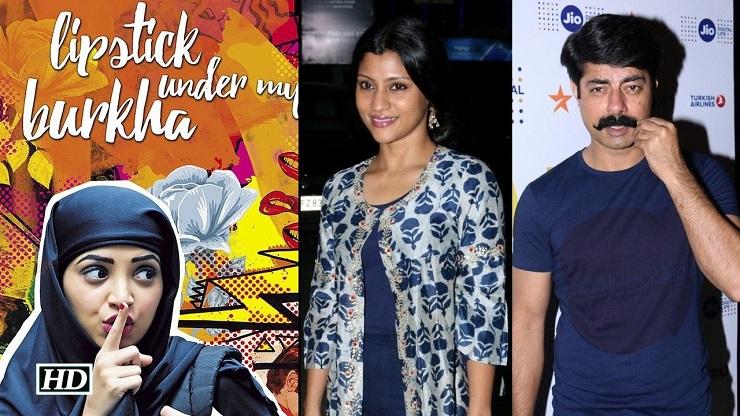ASIACALLING
Outrage over ban of award-winning Indian film labeled ‘pornographic’
"India’s decision to ban the award-winning Hindi film, Lipstick under my Burkha has sparked outrage across the country. "

India’s decision to ban the award-winning Hindi film, Lipstick under my Burkha has sparked outrage across the country.
The film follows the lives of four women, a burqa-clad college girl, a young beautician, a mother of three and a 55-year-old widow.
India’s Central Board of Film Certification said it banned the film because of its explicit nature, and use of strong language.
Jasvinder Sehgal explores the controversy.
Twenty-six-year-old Iram Tasleem, a journalist from Jaipur is watching the trailer of the controversial Indian film, Lipstick under my Burkha.
She wants to write a review of the film for her newspaper, but that’s difficult now that she can’t watch it. The ban, she says, is a slap in the face for freedom of expression.
“This is a women-oriented film and in India such films are hardly produced. To block its public screening challenges women’s rights to free expression. On the one hand we talk about the rights of girl children and their education, but when a girl, women, wish to express themselves they are shut down.”
Tasleem continued, “what is the use then, of article 19 of the Indian Constitution, which guarantees freedom of speech and expression?”
Local film critic and ardent art lover 45-year-old Shabana Dagar has a very different view. Dagar says freedom of expression doesn’t mean having a license to be vulgar.
“Freedom of expression doesn’t mean vulgarity and nudity. Innovative thoughts and ideas can be expressed in other ways too,” said Dagar.
“Adequate precautions and care should be undertaken while practicing freedom of speech, clothes and thoughts. There is a limit to everything and if that is crossed the results are bad,” she concluded.
In the film, Ratna Pathak Shah, a leading Indian actress plays the role of a 55-year-old widow rediscovering her sexuality.
She says the perspective of women in India has changed dramatically over the decades, and that is what the film portrays.
“What I personally feel is that the film depicts the new wave of change happening in our country. People are changing and so are women. This film captures and shows the change. Although the lead role is played by the women but through them the happening of entire world has been showcased,” Shah commented.
Indian authorities say they banned the film for its explicit language, and a scene that includes phone sex, which they say qualifies as pornography.
The board also said the film might be especially offensive to the Muslim community, given it features a burqa-clad woman.
Pehlaj Nihlani, a noted filmmaker, is the chairman of India’s Central Board of Film Certification. He says the board didn’t take the decision to ban the film lightly.
“It’s not like that the film has been banned,” he asserted.
“There is a process for getting the certificate to the film. The panic is being created so that the producer gets mileage and publicity. I don’t want to comment anything more,” Nihlani stated.
But the creators of Lipstick Under My Burkha strongly refute the ban. The film, they say, has a strong feminist message.
“If India is truly a democratic country and the constitution promises freedom of expression as well as gender equality then we have to make that sort of freedom and that equality real for ourselves,” said the film’s director Alankrita Shrivastava.
“I feel that this kind of a decision by the Censor Board is absolutely like striking a blow to women’s rights so I do feel that the dichotomy is very strong because there are women like me. Everybody is feeling this sense of anger that how can the censor board just try and muffle and stifle the women voices,” she said.
However, Alankrita does have a lot of support. Many, like journalist Iram Tasleem say the board’s decision to ban the film should be legally challenged.
“The job of the Central Board of Film Certification is to certify the film. The board cannot censor the film. This is a big question mark on the transparent working of the board,” argued Tasleem.
As for Alankrita, she says the legal fight is just starting.
“There is [the] FCAT, the Film Certification Appellate Tribunal in New Delhi so we are preparing the case to get decision overturned there. And also there are courts after that.”
Lipstick Under My Burkha has so far won several awards at film festivals in Tokyo, Amsterdam, and Scotland, as well as the Oxfam Award for Best Film on Gender Equality.
Many in India hope it won’t be too long before it can be screened in movie cinemas here too.
- Alankrita Shrivastava
- Lipstick under my burkha
- Film censorship India
- Jasvinder Sehgal
Komentar (0)
KBR percaya pembaca situs ini adalah orang-orang yang cerdas dan terpelajar. Karena itu mari kita gunakan kata-kata yang santun di dalam kolom komentar ini. Kalimat yang sopan, menjauhi prasangka SARA (suku, agama, ras dan antargolongan), pasti akan lebih didengar. Yuk, kita praktikkan!